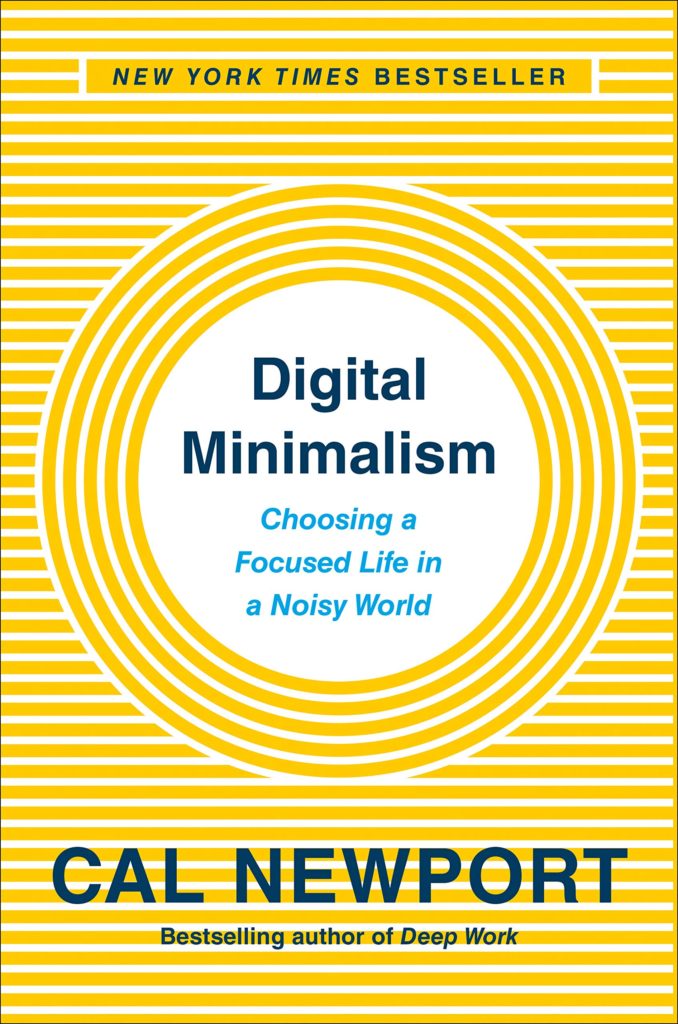Digital Minimalism
Cal Newport is a computer science professor at Georgetown University who makes his living by studying and improving the craft of computer science. Yet in this trenchant manifesto, he argues that to enjoy the fruits of our extraordinary technology, we need to radically limit its role in our lives.
A Philosophy of Technology Use
From the start, Newport is arguing that each person needs a philosophy of technology use. What are these tools for? And how can I use them for the purposes that I most highly cherish? The answers to those questions lead Newport to develop a philosophy of technology based on his own core values: digital minimalism.
To be a person who is present with others, able to accomplish meaningful work, and to live a good life requires intention. Newport appeals to Aristotle early and sustains the refrain throughout the book that this is indeed a question of human flourishing. And his contention is that the overuse of screen technology, and social media in particular, is a path away from meaningful relationships, serious reflection, substantive work, healthy solitude, and human flourishing.
Attention Economy
Newport documents the rise of the attention economy and its social cost. At one time our attention was captured by advertising in magazines, newspapers, and billboards. With the advent of television and then the internet, advertisers had ever more opportunity to capture our attention. Yet the rise of mobile digital devices marked a seismic shift in the attention economy because those who want our attention now have the opportunity to capture it almost anywhere because we carry our devices everywhere.
Yet it isn’t just ubiquity of access. These applications and advertisements that support them are designed, like slot machines, to be addictive.
OK, so I have a highly addictive device in my pocket that gives others virtually unlimited access to my attention. So what? Newport explains that because of the growth of the attention economy, the biggest winners have the greatest capital. They now have virtually unlimited resources to design hyper-palatable experiences on your ever-presnt addictive device. And every moment you spend scratching that itch . . . they are getting paid.
Intention
Newport argues that solid intention is key to capturing the value that a digital service provides without beginning to exhibit addictive behavior. He offers stories of people who made choices to constrain their digital lives in ways that encourage deep relationship, deep work, and solitude. These are not technological Luddites. Like Newport, many of them work in technology; yet they have made intentional choices about the use of technology to avoid its costs to attention.
Practices
Newport is Aristotelian in his prescriptions. Recognizing that practices form the person, he commends specific practices consistent with digital minimalism. As Newport is quick to point out, many of these practices are made possible by technology. This is not the rejection of technology, but the intentional use and constraint of technology for higher purposes. For example, he commends the use of Downtime and Do Not Disturb features offered by iOS.
Yet he is just as quick to commend practices of embrace rather than rejection, and “analog” rather than digital. For example, he enjoins his readers to join something and offers the example of Benjamin Franklin who established a group called a junto to present ideas and essays to one another on a regular basis. As Newport notes, Franklin’s fertile mind was nurtured through this intentional community. For those not interested in book clubs, Newport profiles F3 – a national network of free, peer-led workout groups for men – as an example of a fitness community that forms real social bonds (in addition to getting men out of bed, off the couch, and away from screens). His point is that minimizing the digital will not be successful without replacing it with something better.
Solitude
In his pursuit of flourishing, Newport latches onto the importance of solitude. Drawing on Henry David Thoreau, he connects with a long tradition of the cultivation of attention through solitude. Thoreau took time to sit and watch the ice change on Walden Pond. And we still read his work today because of the attention that he devoted to the material world around him. This, Newport argues, is significant. Thoreau calculated the value of his time and labor, and estimated that he could meet all of his basic needs with a little more than one day’s labor per week. He could have further exhausted himself to have nicer versions of everything but instead was content to work to provide his basic needs in order to give his attention to worthy objects. Newport is imploring his readers to do the same.
Flourishing . . . for others
It is hard to resist the conclusion that Newport and his tribe are the ones that we will want for neighbors, co-workers (employees, peers, and bosses), and friends.
Yet when I look around, I continually witness the digitally addicted. Today I took my daughters to get bagels. As we stood in line, I watched as more than half of those waiting in line flicked their handheld screens like miniature slot machines, ignoring their spouses, friends, children, and fellow bagel-buyers as if this was the most normal thing in the world.
Cal Newport’s call for a philosophy of technology use that constrains the use of screen devices – and social media in particular – has come not a moment too soon. Those who heed its call can enjoy the boon of astounding technology. Those who do not may miss the joys (and pains) of deep relationship, the satisfaction of deep work, the excitement of real intellectual life, the vigor of a fully physical life, and the blessings of solitude.
